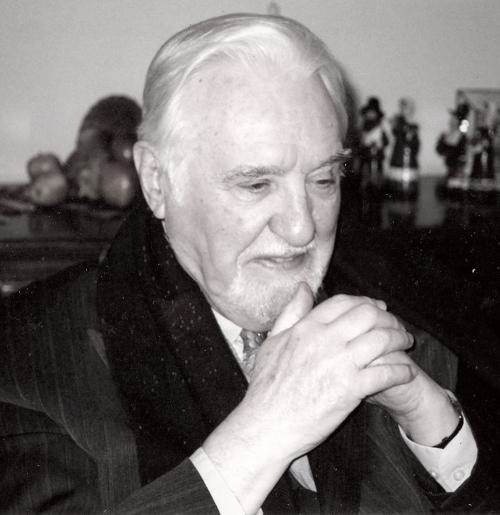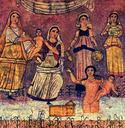Kenneth L. Schmitz (1922–2017) was a Canadian philosopher and metaphysician whose work, always marked by its deeply thoughtful catholicity, sought to bring the thought of St. Thomas Aquinas to bear on modern and contemporary philosophical questions. He served as president of both the Metaphysical Society of America and the North American edition of Communio: International Catholic Review. His friends and mentors included Etienne Gilson, Jacques Maritain, and John Paul II.
What follows are excerpts from Schmitz’s The Gift: Creation, which he gave as the 1982 Aquinas Lecture at Marquette University. Though relatively short, this work perhaps serves as both best introduction to and summation of themes that run throughout all of Schmitz’s corpus: a deeply metaphysical reflection on the world as a gift from God and the status of the creature in relation to its creator. In dialogue with both Thomas Aquinas and the atheistic humanists of the 19th and 20th
centuries, Schmitz demonstrates with great depth and clarity why “gift” is the most fitting category by which to understand creation. In the selection below, Schmitz explains why the reception of oneself (from both God and one’s community) is not a humiliation (contra the atheistic humanists), but rather evidence of the radical generosity of the “most liberal giver” that then also saturates the order of created being. The Gift: Creation remains one of the most penetrating and insightful works ever to be written on what it means to be a creature—that is, to come from nothing. Only in exploring the meaning of our origin can we understand ourselves, for, as Schmitz writes, “Reflection upon creation leads us to the center of the world” (129).
How can a creature be absolutely dependent in its being and also have ontological integrity? Is this a contradiction or is it not? That is a fair question. (72)
. . . within the creational context, the creatureliness of the creature,—its being-a-creature,—is not a received condition which it has; nor, strictly speaking, is being-a-creature even a received condition that it is; rather, the received condition itself is it. The dependence of the creature is absolute because it is dependence upon that very generosity that in its turn is the original condition of the creature’s very being. If the creature were humiliated by this, then its very being would be in a totally deprived and absolutely abject state; so that the creature would be nihil, rather than ex nihilo. . . [Earlier] I suggested that creation is the original gift, a giving of absolute privation. It follows that the creatureliness of the creature (the received condition) is not a nullity, but is rather the ingress of the creature into being; so that, on the basis of that ingress, can be seen the absolute nihil that was the creature’s ontological predecessor. The creature is ex nihilo, that is, it stands outside of absolute privation by virtue of the creative generosity. This creative generosity is the ground for the absolute inequality between creator and creature, that very inequality that has raised the threat to the creature’s integrity. But that same generosity is also the ground for the very being of the creature.
Giving and receiving are the radical conditions without which man could not be. They are the foundation of his being, his own ontological good. All other goods are subsequent to that.
Moreover, since the creative generosity does not extend simply to individuals singly, but in creating them creates their world as well, the creature is in fact a member of the ultimate plurality, the created universe.[1]
More than that, it is by its very nature and being a member for this plurality. It participates in the plurality, and the plurality in and through it. Now, no member of a plurality can be humiliated by the primary condition that makes possible (1) the plurality essential to the member, (2) its membership in the plurality, and (3) its own being as well. Nor is it possible to isolate man, this “thinking reed,” and arrogate to him the foundations of truth and value, in the manner recommended by atheistic humanism. For his interdependence with the non-human as well as human being is so patent and indispensable for his own being, worth and thought that it would be nothing short of impossible for him to produce the intelligible and valuable out of radically anti-intelligible and valueless absurdity. In the context of creation, there can be no plurality, no relation of membership, and no members to be humiliated without the original founding endowment. Humiliation and indignity are relative to that original presupposition . . . (73–5)
The condition for a dynamic plurality of beings to exist is that they receive from others. Since man is a member of the ultimate dynamic plurality, giving and receiving are so pervasive and radical that they constitute the very condition for being human. To protest against the reception, saying that it is a humiliation, is to protest against the very conditions that make human being and human dignity possible; and to protest against the very conditions that make the protest possible. But this is to embrace contradiction and absurdity. Giving and receiving are the radical conditions without which man could not be. They are the foundation of his being, his own ontological good. All other goods are subsequent to that. The original endowment of which creation ex nihilo speaks is the first and indispensable ontological good without which other values and disvalues could not count because they would not be at all. All further considerations are founded upon that original good. In the human order, the specific objects which men hand one another are symbols of a deeper giving and receiving, for they are signs that embody the generosity of their shared being as members of a dynamic plurality. The gift, then, is a medium in and through which giver and recipient affirm their being-in-the-world-together. It is the place of the celebration of their co-presence. (80–81)
Generosity is inseparable from all giving. It is the primal reality at the source of the breaking forth accomplished in giving; for giving is a deed: it is done, something is given. Generosity nourishes the reality of power that is fused with the intentionality of intelligence to form the communication. In terms of creative causality, generosity expresses itself as the power that brings creatures and their world ex nihilo into being. (87)
This excerpt was selected and introduced by Rachel M. Coleman.
[1]
See John Wright, The Order of the Universe in St. Thomas.
Kenneth L. Schmitz (1922–2017) was a Canadian philosopher and metaphysician.
Rachel M. Coleman is an Assistant Professor of Theology at Assumption University in Worcester, MA.



